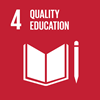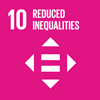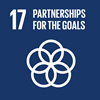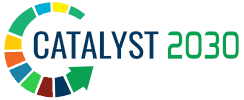
Team ADL
Catalyst 2030 Membership Impact Stories | Series One
This Catalyst 2030 Membership Initiative highlights the impact our members are having at local and regional levels.
Stories from Catalyst 2030 members span the globe, bringing their unique perspectives to life. The purpose behind sharing these stories is two-fold. Firstly, they highlight the positive impact of Catalyst 2030 members’ good work that has ignited transformation and contributed to social change. Secondly, our members’ exemplary practices and distinctive social entrepreneurial insights are showcased to offer a learning opportunity. We will feature Global South and Global North stories every month.
About Series One
Series One focuses on two themes:
- Transforming Literacy Learning Spaces
- Diversity and Inclusion
Series One of the Catalyst 2030 Membership Impact Stories features social entrepreneurs who have created impactful and transforming literacy learning spaces within their spheres of influence.
Introduction
Team ADL, steered by CEO and founder Dr Anita Devi and Deputy Executive Officer Jenny Bowers, was launched in 2017 to address the Special Educational Needs and Disability (SEND) transformation process that the UK government has failed to achieve. Team ADL, a community interest company (CIC), evolved from a decade of consultancy work by Anita who has developed different changemaker aspects and strategies of the system at local, regional and national levels. It is a multiagency organisation that supports schools, colleges, leaders, federations, academy trusts and practitioners around SEND inclusion and education.
Team ADL is committed to a vision of enabling “everyone to thrive in education, employment and life”.
The challenge and beneficiaries
SEND, a long-standing social issue in the UK, underwent significant reforms between 2011 and 2018. The Special Educational Needs and Disability Code of Practice: 0 to 25 years statutory guide was published in 2014, following the passing of the Children and Families Act. This code of practice requires that Schools who have SEND learners provide an annual report on their needs. However, the creation of a thriving SEND community that supports all SEND learners remains out of reach. Seeing the urgency to close gaps and support schools to conduct systemic change, Anita started Team ADL to support the reform process for the SEND sector in the UK and beyond.
According to a report1 published by the Office for Standards in Education, Children’s Services and Skills (Ofsted) in June 2021, the pandemic intensified the long-standing issues related to SEND. Parents, SEND leaders and care providers, despite having worked hard to tackle challenges triggered by COVID, still found local areas affected by persistent weaknesses, including:
- a lack of joint commissioning
- no co-production or co-production that was not working properly
- poor-quality education, health and care plans
A 2022 publication2 presented by the UK’s Secretary of State for Education, revealed that despite unprecedented investment, the system was not delivering value for money for SEND children, young people and families. The report further mentioned that a vicious cycle of delayed intervention, low confidence and inefficient resource allocation were all part of the challenge. Understanding the long-standing challenges in the SEND sector, Team ADL is not just providing consultancy service or products. They are intentionally and consistently changing and shaping the system through their advisory service.
The transformation
As a thought leader based in the UK, Anita has worked in over 15% of local authorities and her training has created impact for schools in different localities, including Australia, China, India, Kenya, Malawi, Philippines, Sri Lanka, USA, Vietnam, Zambia and countries in Europe.
The transformation that Team ADL works to bring about involves systems change in three areas: growing organisations, developing people and strengthening localities.
Growing organisations
One recent example of Team ADL’s effort to create system change was at a school that did not have an effective leadership system to support children with SEND. Team ADL conducted a provisional SEND review for the school, located in the Southeast of the UK. The school had 250 staff members and 1,500 secondary school students, of whom more than 160 were identified special education needs or disability.
In July 2022 Team ADL was invited to a school where a previous consultant had been working for six months. Little change was experienced. Team ADL promised the school they would bring about change within two days. On the first day, a survey was conducted with the teaching assistants and dialogues were struck with all the stakeholders. Then a ten-day gap was given for staff teams to consider bottom-up changes. When Team ADL went back on Day 2, they found that staff had taken up the responsibility to initiate change themselves. The senior leadership team mentioned that they had actually witnessed changes happening.
At a personal level, the way the staff dressed became more professional. At the school level, the proactiveness to change was improved. In merely two days, Team ADL helped to change the attitude of the school staff.
In September, Anita went back to conduct whole school training. Within an hour of training, the staff was already on board with the changed vision. In less than three days, Team ADL turned around the system and processes of this school by encouraging the staff to take ownership of a change process. Moreover, following a SEND review Anita conducted for the school, she provided tools and a method to meet compliance.
Developing people
Dr Anita Devi was involved in developing SEND leaders under a SEND leadership pipeline programme, from initial teacher training all the way up to developing SEND leaders. In 2017, she worked with The National Association of School-Based Teacher Trainers, assisting schools to meet the statutory requirements. Anita has been working with a number of teacher training providers that conduct a one-year teacher training course. At one of the providers, within the first six weeks of starting the training, the trainees felt confident enough to develop their own research projects on areas of SEND needs, which were at a Level 6 requirement. In 2022 Team ADL provided supervision to 250 teacher trainees.
Strengthening localities
Team ADL worked with multi-academy trusts and local authorities to train their leaders to undertake provisional reviews as a reporting requirement for the governing body. By the end of the autumn term in 2022, Team ADL had trained 17 schools to do provisional reviews in the Southwest of the UK. Within those 17 schools, there is an estimated minimum of 10,000 SEND learners.
In the 2022 academic year, Team ADL worked in over 100 settings and led change management in more than 50 of them. The other 50 involved the offering of training at the individual level.
Since the SEND statutory requirement was introduced in 2014, at the end of each academic year, every school has to report on the identification of SEND students and their needs to the governing body. In terms of systems change, Team ADL has enabled schools to take the necessary steps towards compliance in reporting, as required under the Equality and Children and Family Acts.
Team ADL believes that strengthening the competence of school leadership and staff teams to embrace legislative responsibility, is a core step towards improving the SEND sector. Through deciphering the complexity of statutory requirements and providing a structured approach to facilitate the generation of SEND reviews, Team ADL helped schools become compliant. The tools, knowledge, method and clarity TEAM ADL offered school leadership and staff teams helped them understand how to fulfil the reporting requirement in a structured and strategic way.
Team ADL’s Sustainable Development Goals pursuit



Team ADL, in essence, addresses SDG 4 Quality Education within the SEND sector via its online platforms and face-to-face consultation and services. The transformation outcomes from this work brings about “reduced inequality” (SDG 10); with the SEND learners acquiring better education and “collaborative partnerships” (SDG 17) forged with teachers and SEND leaders within each school.
Team ADL is currently leading a Leadership 365 SEND Programme. This programme, delivered through training and resource allocation by a consortium of providers, ensures that all schools / colleges can unite their stakeholders in collective conversations about improving outcomes for children and young people through inclusion.
Project 365 SEND is also an app that has registered intellectual property rights for its innovative concept design. In a time when the world is facing financial crisis and the consequences of post COVID-19, the 365 SEND app is a viable solution for schools / colleges that use English as a teaching medium and have access to the internet. Profiled by the Royal Society of Arts in May 2022, this approach is a simple yet profound solution for inclusion.
Website Links
Endnotes
1SEND: old issues, new issues, next steps. Publication released by Ofsted in June 2021.
2SEND Review Right support, right place, right time. Government consultation and the SEND and alternative provision system in England. Crown copyright 2022.
